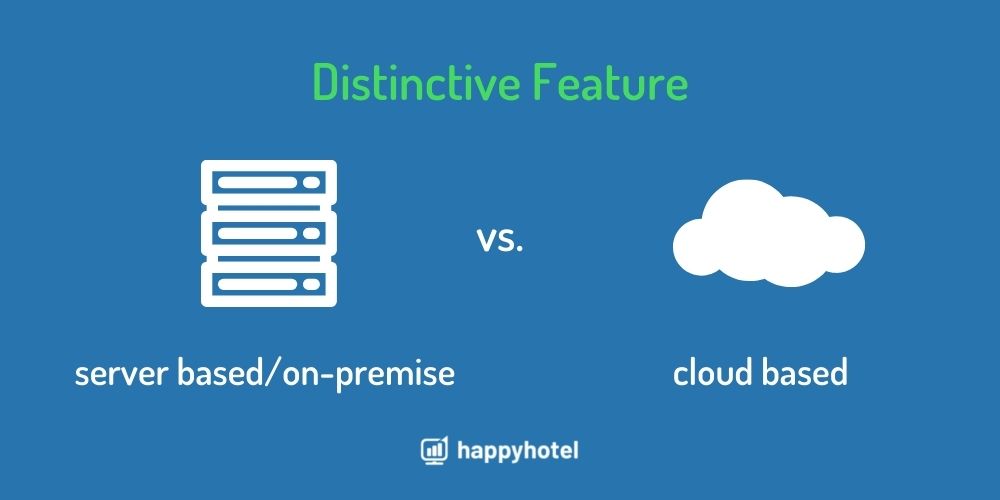Almost all hoteliers use property management systems (PMS) to manage their day-to-day operations. The times of paper documentation are largely over. The range of PMS providers on the market is correspondingly diverse. Therefore, we give you an overview of the most common systems here.
- Definition of Property Management Systems
- Server- vs. cloud-based PMS
- PMS comparison
- Connection to a PMS
Definition of Property Management Systems
Property Management Systems (PMS) enable the computer-aided control of the operative day-to-day business. This applies to smaller hotels as well as hotel chains. In the past, the PMS was the “front office platform” containing functions such as booking reservations, managing room rates, check-in/check-out for guests, room allocation and invoicing. Today, modern PMSs are more of a management tool. The PMS is the central system in which all other programmes converge.
Accordingly, the following tasks a PMS carries out mainly (partly through connection to other systems):
- Bookings / reservations (also for group bookings and events)
- Front office (incl. guest management)
- Housekeeping
- Billing and accounting
- Maintenance
- Reporting
Server- vs. cloud-based PMS
When choosing a PMS, hoteliers consider costs, usability and support. However, the biggest differentiator is: managing the software locally or in the cloud.

Until a few years ago, property management systems (PMS) were only available with an on-site server.
Today, you are free to choose. However, the future of PMS (or software solutions in general) probably is cloud based systems. Among other things, the expansion of internet speed has ensured this.
Cloud-based PMSs are not tied to installation on an on-site server. The provider manages the solutions. Consequently, the provider also ensures comprehensive data backup. Updates and upgrades are also installed automatically. This not only saves time, but above all costs. Also, maintenance is remotely, too. In addition, the systems and their interfaces are constantly being further developed.
In short, cloud-based solutions are a good choice for hotels regardless of the number of beds. The implementation is done quickly. The system is accessible from all devices at all times. You can use it to manage your hotel from anywhere: Smartphone, tablet or PC.
Furthermore, one of the biggest advantages of cloud-based systems is connectivity. Because this hotel software can easily be connected to other management systems via interfaces. This further optimises the processes in your hotel.
PMS comparison

Here we present some of the most common systems. You’ll see when you do your research: There are many different providers and a comparison is worthwhile.
Apaleo
The company apaleo exists since 2016 and is based in Munich. According to its own information, it has developed the first PMS that is based exclusively on a completely free 2-way API (interface). This makes apaleo a completely open PMS platform. Connection to other systems is quickly and seamlessly possible.
More about the integration of apaleo and happyhotel
Mews
A Dutch team of former hoteliers foundet Mews. Today, the company has its headquarter in Prague and attaches great importance to internationality. This concerns both the employees and the development of the software itself. From the beginning, the Mews Hospitality Cloud was designed as a very open and versatile expandable property management system.
ibelsa.rooms
ibelsa.rooms is also a cloud-based solution. The software has been on the market since 2010 and, according to the manufacturer, focuses on easy connection to third-party systems without additional costs.
RoomRaccoon
In addition to the PMS, the hotlsoftware package includes a channel manager and a booking engine. According to the manufacturer, the package adpats especially to the needs of smaller hotels.
Fidelio Suite8
Fidelio is one of the on-site applications that has been on the market the longest. The product is now part of Oracle. The current software Fidelio Suite8 is a fully integrated version with many functions. It is the only non-cloud-based system we speak of in this text, as it has been one of the most widely used applications in Europe for decades.
Opera
This is a cloud-based and still rather young software solution form ORACLE. OPERA Cloud is a property management solution with important functions for the requirements of hotels of different sizes and complexity. On top of that, it offers many partner interfaces.
Protel
The company behind Protel hotel software has been on the market since 1994 and specialises in the development of hotel software. Here, customers can choose between two versions: An on-site installed software or Protel Air in the cloud.
Sihot
Sihot is a hotel software from Gubse AG. The product was launched as one of the first Windows applications back in 1986. In the meantime, the development into a complete module family has taken place. The open structure, modularity and configurability offer individual solutions for every hotelier.
Connection to a PMS
When choosing a PMS, you need to think about a lot of details. On the one hand: compare the costs. Furthermore, the usability of the software and the support of the provider play a major role. Furthermore, it is extremely important that you pay attention to the most essential interfaces.
It should be possible to integrate the booking engine, the channel manager and the CRM and accounting software. Consider the connection to a revenue management system as well. Because a large amount of the data you need for this you can get out of the PMS.
It is best to compare property management systems online. In the meantime, it is possible to arrange a free trial period with many providers. On top of that, we would be happy to show you how to connect your system directly to happyhotel.
